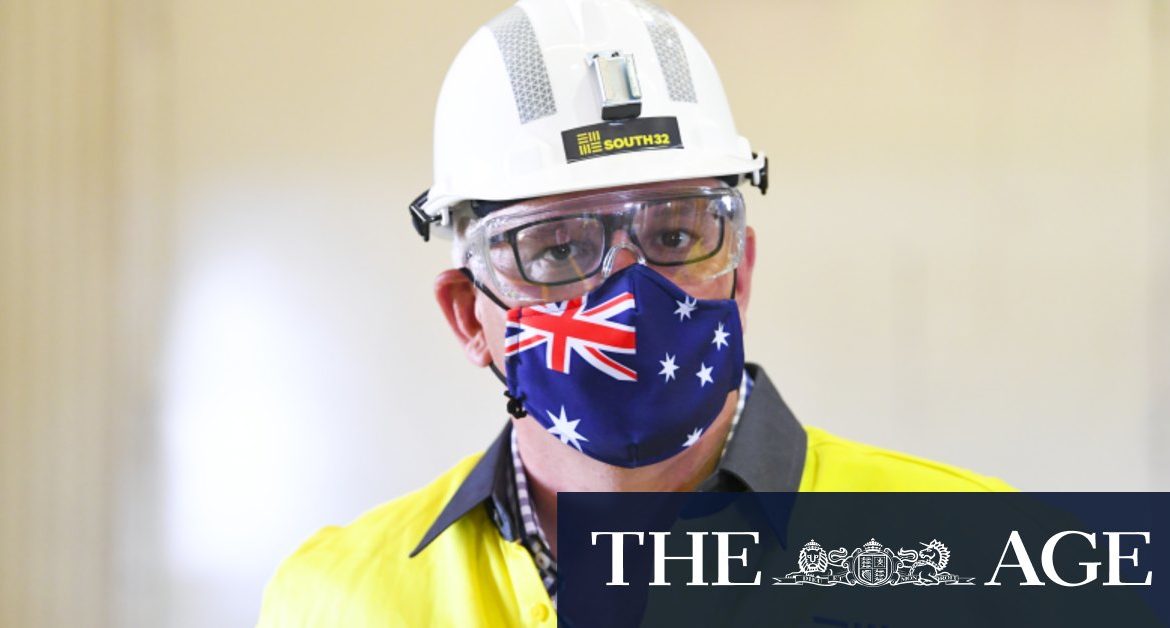“And that’s a lot of opportunity for those communities. And, look, I think people who work in these sectors know that things change over time. And they understand that.
“But what’s important is that we continue to extract and get the value from the opportunity and wealth that’s there that really benefits the rest of this country.”
Asked if he would support the creation of new mines producing thermal coal, which is used for power generation, Mr Morrison said “we’re not subsidising any mines” and said the industry was viable and profitable.
“And so long as they comply with all the environmental standards and all the environmental requirements, well, they should get on with their business,” he said.
Mr Morrison, who brought a lump of coal into Parliament as Treasurer in February 2017, denied any concern about voters in Sydney and Melbourne because he had not visited a coal mine since becoming Prime Minister in August 2018.
Prime Minister Scott Morrison thanks workers after emerging from a lift after being temporarily stuck inside due to a door failure during a visit to South32 Cannington Mine in McKinlay, Queensland on Wednesday.Credit:AAP
Mr Morrison’s comments are in line with similar remarks from Labor leader Anthony Albanese, who has rejected arguments from environmentalists that Australia should stop exporting coal.
“The global steel and aluminium industries – all needed to build solar panels and wind towers – will continue to demand high-quality Australian coal for decades to come,” Mr Albanese said last year.
But the prospects for coal mines and their workers are fiercely disputed when environmental groups have declared the industry a danger to the planet and a troubled economic case as demand falls.
The International Energy Agency last year forecast surging demand for renewable energy compared to coal and gas.
“I see solar becoming the new king of the world’s electricity markets. Based on today’s policy settings, it is on track to set new records for deployment every year after 2022,” said IEA chief executive Fatih Birol.
Greens leader Adam Bandt wants Australia to close the coal industry by 2030 in order to protect the planet and to deal with the falling demand from the country’s three biggest customers.
Those customers – China, Japan and South Korea – have all set net zero emission reduction targets for 2030.
“Liberal and Labor are selling out coal workers by refusing to tell them the truth about the future of exports and domestic use,” Mr Bandt said.
Mr Morrison said the government would “meet and beat” the target promised at the Paris climate change summit, which was to reduce emissions by 26 to 28 per cent by 2030 compared with 2005 levels.
Loading
Asked for the modelling to prove that point, Mr Morrison replied: “You’ve already got it.”
The government’s emissions projections, updated last month, show emissions are projected to decline to 478 million tonnes in 2030, which is 22 per cent below 2005 levels.
Under a scenario aligned with government policy, known as the Technology Investment Roadmap, emissions are forecast to be 436 million tonnes in 2030, which is 29 per cent below 2005 levels.
The government’s critics doubt the Technology Investment Roadmap will generate the benefits claimed so far.
David Crowe is chief political correspondent for The Sydney Morning Herald and The Age.
Most Viewed in Politics
Loading







